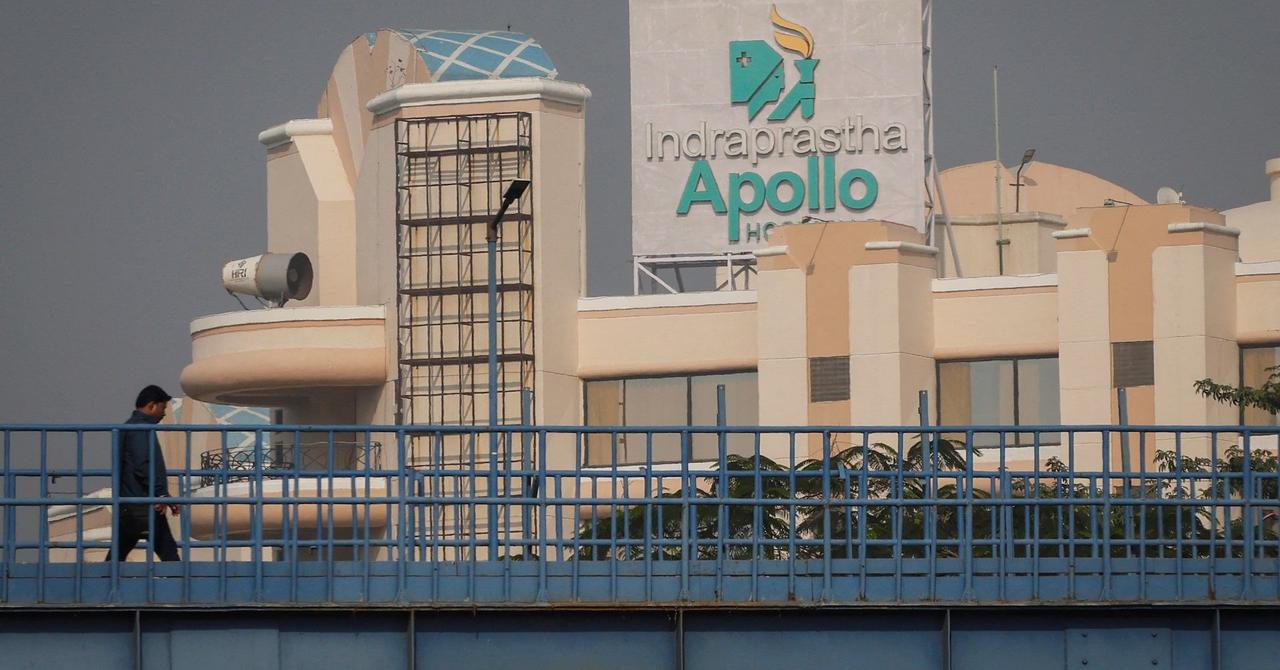Apollo Hospitals to Double AI Investments Amid Strong Q1 Performance
2 Sources
2 Sources
[1]
India's Apollo Hospitals to double AI investments, beats profit estimate
HYDERABAD, Aug 12 (Reuters) - India's Apollo Hospitals Enterprise (APLH.NS), opens new tab plans to double its investment in artificial intelligence capabilities over the next two to three years, its CEO said, after the company beat first-quarter profit estimates on higher patient volume. The hospital chain already uses AI tools in diagnosis to read X-rays, scan reports and also in endoscopy - a medical procedure to examine the inside of the body using a camera, CEO Madhu Sasidhar told Reuters on Tuesday. Many large private hospital chains in India, like their western counterparts, are investing in AI capabilities to improve patient diagnosis and decisions related to medical procedures, among others uses. Apollo recently developed technology to read existing scan reports and predict the risk of liver fibrosis in the future, Sasidhar said. "We are also bringing some other new generation agentic AI-type tools," he said. He did not quantify the size of Apollo's existing investment in AI. Apollo, headquartered in the south Indian city of Chennai, partnered with Microsoft (MSFT.O), opens new tab earlier this year to develop AI-based tools to be used in healthcare. Some of them are in early stages of testing, Sasidhar said. Indian hospital chains such as Apollo and Manipal have also been increasing their bed count for a larger share of the market, including through acquisitions of smaller hospital operators. Apollo said it is on track to add 4,370 beds over the next 3-4 years through acquisition, new hospitals and expansion of existing facilities. Its overall bed capacity is currently more than 10,000. The company's consolidated net profit rose 41.8% to 4.33 billion rupees ($49.40 million) for April-June, beating estimates of 3.86 billion rupees, according to data compiled by LSEG. While its overall occupancy rate dipped from last year, in-patient volume grew 3% and average revenue per in-patient increased by 9%, according to Apollo. Quarterly total revenue rose 15% to 58.42 billion rupees, beating estimates of 57.44 billion rupees. The company said it expects double-digit revenue growth for the current financial year. ($1 = 87.6520 Indian rupees) Reporting by Rishika Sadam; Editing by Leroy Leo Our Standards: The Thomson Reuters Trust Principles., opens new tab
[2]
India's Apollo Hospitals to double AI investments, beats profit estimate
HYDERABAD (Reuters) -India's Apollo Hospitals Enterprise plans to double its investment in artificial intelligence capabilities over the next two to three years, its CEO said, after the company beat first-quarter profit estimates on higher patient volume. The hospital chain already uses AI tools in diagnosis to read X-rays, scan reports and also in endoscopy - a medical procedure to examine the inside of the body using a camera, CEO Madhu Sasidhar told Reuters on Tuesday. Many large private hospital chains in India, like their western counterparts, are investing in AI capabilities to improve patient diagnosis and decisions related to medical procedures, among others uses. Apollo recently developed technology to read existing scan reports and predict the risk of liver fibrosis in the future, Sasidhar said. "We are also bringing some other new generation agentic AI-type tools," he said. He did not quantify the size of Apollo's existing investment in AI. Apollo, headquartered in the south Indian city of Chennai, partnered with Microsoft earlier this year to develop AI-based tools to be used in healthcare. Some of them are in early stages of testing, Sasidhar said. Indian hospital chains such as Apollo and Manipal have also been increasing their bed count for a larger share of the market, including through acquisitions of smaller hospital operators. Apollo said it is on track to add 4,370 beds over the next 3-4 years through acquisition, new hospitals and expansion of existing facilities. Its overall bed capacity is currently more than 10,000. The company's consolidated net profit rose 41.8% to 4.33 billion rupees ($49.40 million) for April-June, beating estimates of 3.86 billion rupees, according to data compiled by LSEG. While its overall occupancy rate dipped from last year, in-patient volume grew 3% and average revenue per in-patient increased by 9%, according to Apollo. Quarterly total revenue rose 15% to 58.42 billion rupees, beating estimates of 57.44 billion rupees. The company said it expects double-digit revenue growth for the current financial year.
Share
Share
Copy Link
India's Apollo Hospitals Enterprise plans to increase its AI investments over the next few years, following a successful first quarter with higher profits and patient volume.
Apollo Hospitals' AI-Driven Growth Strategy
India's Apollo Hospitals Enterprise, a leading healthcare provider, has announced plans to significantly boost its artificial intelligence (AI) capabilities. The company intends to double its AI investments over the next two to three years, according to CEO Madhu Sasidhar
1
2
. This strategic move comes on the heels of a strong financial performance in the first quarter of the fiscal year.
Source: Reuters
Current AI Applications and Future Plans
Apollo Hospitals is already leveraging AI technology in various aspects of patient care. The company utilizes AI tools for diagnostic purposes, including reading X-rays and scan reports, as well as in endoscopy procedures
1
. Recently, Apollo developed an innovative technology that can analyze existing scan reports to predict the risk of liver fibrosis, showcasing its commitment to preventive healthcare1
2
.Sasidhar also hinted at the introduction of "new generation agentic AI-type tools," although specific details were not disclosed
1
. This expansion of AI capabilities aligns with a broader trend among large private hospital chains in India and globally, who are increasingly investing in AI to enhance patient diagnosis and improve medical decision-making processes.Microsoft Partnership and AI Development
Earlier this year, Apollo Hospitals formed a strategic partnership with Microsoft to develop AI-based tools for healthcare applications
1
2
. While some of these tools are still in the early stages of testing, the collaboration underscores Apollo's commitment to staying at the forefront of technological advancements in the healthcare sector.Expansion Plans and Market Share
In addition to its AI initiatives, Apollo Hospitals is actively expanding its physical presence. The company has outlined plans to add 4,370 beds over the next 3-4 years through a combination of acquisitions, new hospital constructions, and expansions of existing facilities
1
. This growth strategy aims to increase Apollo's market share in the competitive Indian healthcare landscape.Related Stories
Strong Financial Performance
Apollo Hospitals' focus on technology and expansion is backed by robust financial results. For the April-June quarter:
- Consolidated net profit rose by 41.8% to 4.33 billion rupees ($49.40 million), surpassing analyst estimates
1
2
. - Total revenue increased by 15% to 58.42 billion rupees, also beating market expectations
1
. - In-patient volume grew by 3%, while average revenue per in-patient increased by 9%
1
2
.
Despite a slight dip in overall occupancy rates compared to the previous year, these strong financial indicators have positioned Apollo Hospitals for continued growth. The company has expressed confidence in achieving double-digit revenue growth for the current financial year
1
2
.Industry Trends and Competition
Apollo's strategic moves reflect broader trends in the Indian healthcare sector. Other major players, such as Manipal Hospitals, are also expanding their bed capacity and exploring technological advancements to gain a larger market share
1
. This competitive landscape is driving innovation and investment in cutting-edge technologies like AI across the industry.As Apollo Hospitals continues to invest in AI and expand its physical infrastructure, it is poised to maintain its position as a leader in the Indian healthcare market, potentially setting new standards for the integration of technology in patient care.
References
Summarized by
Navi
[2]
Related Stories
Apollo Hospitals Invests in AI to Ease Healthcare Staff Workload and Improve Patient Care
13 Mar 2025•Health

Qure.AI: Indian Healthcare AI Startup Eyes Profitability and IPO Within Two Years
20 May 2025•Business and Economy

AI in Healthcare: Revolutionizing Diagnosis and Patient Care in India
08 Oct 2024•Health

Recent Highlights
1
ByteDance's Seedance 2.0 AI video generator triggers copyright infringement battle with Hollywood
Policy and Regulation

2
Demis Hassabis predicts AGI in 5-8 years, sees new golden era transforming medicine and science
Technology

3
Nvidia and Meta forge massive chip deal as computing power demands reshape AI infrastructure
Technology





